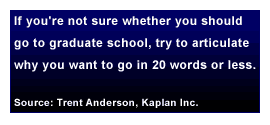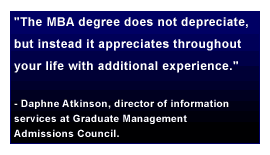NEW YORK (CNNfn) - You've been out in the work force for a few years, but now feel as if you've hit a brick wall.
Going back for a higher degree, more specifically a master's degree in business administration (MBA), involves a huge investment of time, money and effort - not to mention the years of would-be earnings and retirement savings lost while you're stuck in the classroom.�
However, an MBA remains an invaluable credential for anyone looking to climb the corporate ladder. And it can provide a significant boost to your long-term earnings potential.�
"Grad school is not a goal, it is a means to an end," said Trent Anderson, vice president and publisher of Kaplan, Inc. "It's important to think about what you want to do - whether you are changing industries, switching functions, or trying to make progress within an industry, you should think about those things ahead of time."
Not sure if it's for you?
Each year, some 100,000 MBA students graduate from colleges and universities nationwide.�
Admittance to business school, however, has become increasingly difficult, as schools tighten their GMAT and grade point average requirements. Many now require 5 years or more work experience before applications are even considered.
 As with undergraduate programs, the better the school, the more competitive it is to get in. As with undergraduate programs, the better the school, the more competitive it is to get in.
The University of Pennsylvania's Wharton School of business, one of the nation's most prestigious MBA programs, for example, accepts less than 13 percent of applicants. Tuition and fees run just over $28,000 per year for the two-year program.
It's a worthwhile investment, however, for the lucky few who make the grade. The median total compensation for the 1999 graduating class at Wharton was $159,000, including base pay, bonuses and other forms of compensation.
"It's not like an investment in a car, which depreciates the second you drive it out of the lot," said Daphne Atkinson, director of information services at GMAC, the Graduate Management Admission Council, a non-profit education organization that oversees the Graduate Management Admission Test (GMAT).� "The MBA degree does not depreciate, but instead it appreciates throughout your life with additional experience."
Harvard Business School's median earnings for the class of 1999 was reported at $120,000, which consists of base salary, signing bonuses, tuition reimbursement, and guaranteed year-end bonuses.� Program administrators estimate students will need just under $52,000 per year to cover classes and living expenses, including the annual tuition of $28,500.�
Students who graduated from Brigham Young University's MBA program in Provo, Utah, that same year earned a median annual salary of $62,000, with the lowest salaries being $30,000 and the highest $120,000.
The university charges members of the Mormon Church $5,540 per year for the two-year program (since they tithe their earnings) and non-members $8,320, not including books which set students back another $1,200 to $2,000 a year.

BYU's MBA program typically accepts anywhere from 33 percent to 50 percent of applicants, but program secretary Laura Thompson, said applications have dropped off over the last few years at the school - as they have done for most business schools.
"The economy is doing so well that students figure why quit this job and go back to school," she said, noting the range of pay for graduates at BYU's business program is so wide because some students choose to remain in their hometowns, where pay levels may be low. "Some don't want to move. Others will go anywhere. Jobs on the East or West Coast pay the most."
Decisions, decisions
Deciding whether or not an MBA is right for you all comes down to priorities, Kaplan's Anderson suggests, noting it should be motivated by something more than just the money.
"In 20 words or less you should be able to say why you want to go to business school," he said.
Experts suggest potential applicants talk to career counselors and colleagues, who can give them the inside scoop on how important a higher degree is in your field and whether it really can open the doors to promotions.
Also, try interviewing past and present MBA students to find out what prompted them to return to school and what they got out of if personally and professionally. And, to ensure your degree fits your areas of interest, think about the industry you want to work in, looking for schools that have strengths in that field.�
Lastly, keep in mind the MBA experience is not just about the classroom. It's also a key place to make the connections that will set your career in motion.�
Jeanne Liedtka, associate dean for MBA education at the University of Virginia's Darden business school advises potential candidates to think about who you want to spend the next two years with, as well as with whom you want to build your lifelong network.�
Intangibles such as the living environment and social atmosphere should be considered as well, she said.�
MBA at work
As with undergraduate degrees in business, an MBA is best suited for upper-level managerial, administrative and executive positions at financial institutions, accounting firms, insurance companies and other large corporations. Sales, marketing and purchasing activities also encompass a large portion of the jobs graduates with a business background pursue.
Many become branch managers for banks, financial analysts, portfolio managers, venture capitalists, budget officers, tax accountants and auditors. Others provide consulting services for pension funds, investment banks, underwriters and other companies needing guidance on how to boost profits.
Pay levels vary wildly, depending on job title and geography.
 But generally speaking, college grads with a master's degree earn an average of $49,200, compared to bachelor's degree holders who make closer to $43,500 a year, according to the "College Majors Handbook," published by JIST Works, Inc. (Those who complete a doctoral program bring in close to $61,000.) But generally speaking, college grads with a master's degree earn an average of $49,200, compared to bachelor's degree holders who make closer to $43,500 a year, according to the "College Majors Handbook," published by JIST Works, Inc. (Those who complete a doctoral program bring in close to $61,000.)
When broken out by job title, it's clear that financial posts requiring an MBA pay the most.
Financial managers, for example, earned just over $55,000 in 1998, the Bureau of Labor Statistics reports in its latest Occupational Outlook survey. Security brokers and dealers that year earned just under six figures.
Salaries of assistant controllers and treasurers last year varied from $42,700 in the smallest firms to $84,000 in the largest firms, according to a 1999 survey by Robert Half International, a staffing services firm specializing in accounting and finance. Corporate controllers earned between $47,500 and $141,000; CFOs and treasurers earned from $65,000 to $319,200. Salaries were 10 percent higher for those with a graduate degree.
Paying your way
While the payoff may be generous, funding your studies is another matter entirely.
The National Association of Student Financial Aid Administrators in Washington reports the average graduate student at a private college or university master's program accumulates debt of roughly $30,000 upon graduation.
Roughly 50 percent of all MBA students require some form of financial aid, whether it is employee tuition-reimbursement benefits, scholarships, low-interest loans or fellowships, NASFAA reports.
According to a GMAC survey of the MBA class of 2000, 35 percent of students financed their MBA through savings, 36 percent with private or federal loans, 17 percent through scholarships, and 12 percent through corporate sponsorship.�
Some people plan years in advance to go back to school, just as they plan to buy a house, setting aside personal savings to pay for all or a large portion of the cost upfront.�
Others choose to stay on with their current employer and tap into the tuition reimbursement benefits the boss provides. That means returning to school on a part-time basis, and taking courses at night and weekends. But it can save you tens of thousands of dollars in costs.
The Employee Benefit Research Institute reports that 65 percent of full-time employees and 36 percent of part-time employees of medium and large private firms are eligible for job-related educational assistance benefits. In many cases, reimbursement is contingent upon a B or better grade point average and course loads that are directly related to the job.
Reimbursement programs also often come with clauses that require you to remain with the company for 3 to 5 years, or more, after you've earned your degree. If that's the case in your benefits policy, it's wise to stick to the agreement. Leaving before your time is up is considered a breach of contract and you may be required to pay all of that reimbursement back.
Lastly, if you're angling for a job in the new economy Internet world, you can always take a gamble.
Those who act spontaneously may pay later, by taking out low-interest loans and perhaps hoping to cash in on a "loan forgiveness" plan as part of a future compensation package.�
Many dot.com and Internet-related companies, struggling to compete for talent, are offering to pay off student loans on the first day of employment. In most cases, those offers come with caveat that you remain with the firm for a minimum of 3 to 5 years. 
-- staff writer Shelly K. Schwartz contributed to this report.
|

